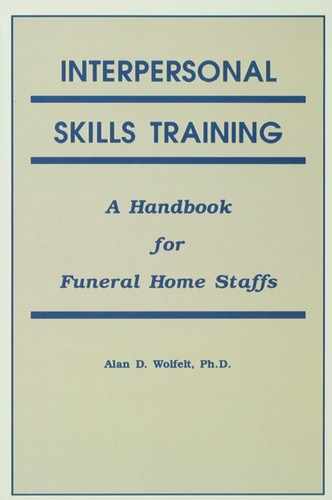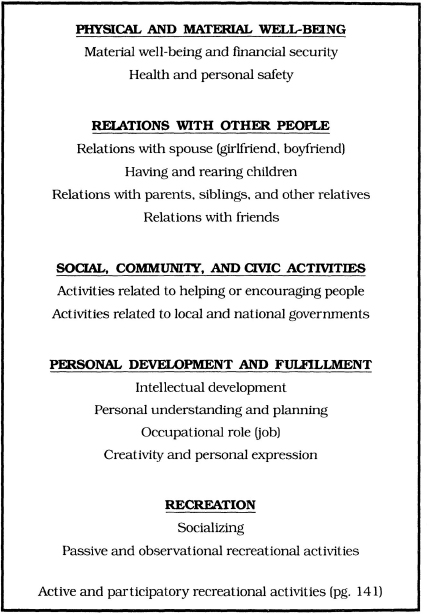ACKNOWLEDGING THE NEED FOR INTERPERSONAL SKILLS IN THE FUNERAL HOME
“It is one of the most beautiful compensations of this life that no man can sincerely try to help another without helping himself.”
Ralph Waldo Emerson
One of the most frequent questions a funeral director is asked is, “What made you want to be a funeral director?” While as many answers can be given as there are funeral directors, a common theme often evolves from the content of the answer: “Because I wanted to help people.” Helping others is an honorable involvement and, hopefully, you are proud to be a helping funeral director!
Helping a family before, during, and after a death is a very rewarding experience. Anyone who has ever helped a family during this time knows of the wonderful feelings that come from having helped. To learn how to help even more effectively will be even more rewarding.
The science and art of working in a funeral home requires a number of skills: business, technical, and interpersonal. If we search for the difference that spells success for some and mediocrity or even failure for other funeral homes, the interpersonal area continues to surface as an important factor.
Often, the routine parts of the job are relatively standardized from one funeral home to another, but the “personal” factor varies depending upon the desire, commitment, and patience of each and every funeral home employee who comes in contact with the family before, during, and after the funeral. The majority of your day as a funeral director is spent interacting with other people. As a result, your ability to skillfully develop and promote human relationships becomes very important. Keep in mind that these interpersonal skills are learnable, not inherent.
Most everyone knows when he or she talks with or observes others who have good interpersonal skills. They are persons we enjoy being around, both during times of work and play. The qualities and skills these persons possess are somewhat difficult to define because they represent a combination of skills. What makes sense, however, is that the helpful qualities we see in others are some of the same qualities we might want for ourselves. These helpful qualities and skills will be identified, explored, and illustrated in this book.
How often have you heard the comment, “The problem is poor communication?” The reality is that effective skills in interpersonal communication serve the foundation for successful living in this world. The American Institute for Research (Flanagan, 1978) worked to define the quality of life for Americans and evolved 15 categories grouped under five headings which are listed in Figure 2.1.
The significance of effective interpersonal skills is obvious as you review the list in Figure 2.1. One entire heading focuses on interpersonal activities (RELATIONS WITH OTHER PEOPLE) and the other four could not be fulfilled without good interpersonal skills.
Figure 2.1. Qualities of life as identified by American Institute for Research.
When you think about the people in your circle of friends whom you most enjoy being around and then think about the personal qualities that they possess, what comes to mind? When given time to think about this question, most persons will mention some of the following qualities:
able and willing to listen,
trustworthy,
dependable,
understands me,
truthful with me,
will compromise,
sense of humor,
I feel comfortable with,
lets me be me, and/or
gives me permission to feel my feelings.
Add several of your own:
As you review this list, one thing is obvious: Interpersonal skills dominate the list. This is important because we often think of education, training, job status, family background, and other noninterpersonal factors as being important in successful relationships, both business and personal. While true these factors can be beneficial, what really happens after you meet someone, regardless of who they or you are, is determined by the quality of your interpersonal relationship.
INTERPERSONAL SKILLS AND CHANGES WITHIN FUNERAL SERVICE
As funeral service continues to change and some funeral homes are being forced to close their doors, the interpersonal skills dimension in the profession will take on an even more important role. The need for effectiveness in interpersonal relationships extends beyond the funeral director to every funeral home employee.
As experience demonstrates, one negative interaction can cause headaches; that small incident can overshadow all of the good things that had been done before. This fact alone underlies the importance of skills training in interpersonal relationships for every funeral home employee.
Similarly, the person in the funeral home who answers the telephone, whether a secretary, part-time assistant, or student helper, frequently has the first contact with the family. Part-time help often interacts with family members to a large extent. These persons are on the front line, and an important aspect is for families to perceive them positively. The public’s perception of anyone who is connected with the funeral home will be the very perception of the funeral home as a whole.
Historically, persons working within funeral service have been well-respected members of their communities. Funeral directors and other funeral home employees knew the families they served personally, and, as a result, the relationships were based on friendship through the years. This is still true in some locations. But in many areas, the increasing population, urbanization of formerly rural areas, expansion to the suburbs, and the frequent geographical distance between family members has significantly changed the families served. Add to these factors the general mobility of society; then the need for interpersonal skills training becomes even more apparent. As a result of public demand, the importance of interpersonal skills is rapidly moving from “desirable” to “necessary.”
POTENTIAL ROLE CONFLICT BETWEEN HELPER AND BUSINESS PERSON
Directly related to interpersonal skill development in funeral service is the potential role conflict between helper and businessperson. I am often asked, “Is it possible to be both a businessperson and a helper?” YES. Anyone involved in helping professions must be a businessperson, or he or she will not survive very long.
The mix between helper and businessperson, however, has to exist so families will feel good about the service (thus, they must feel good about the staff). At the same time, the funeral home must be able to generate profit. The roles of helper and businessperson have to be in operation at the same time. Typically, if you provide good service, profits will follow. Consequently, service as a priority will generate successful business results.
One realistic goal for staff training in human relations skills is for all staff to possess the skills necessary to help people before, during, and after death, while maintaining a “helper” role in the eyes of the family. This is an achievable goal and one certain to lead to self-satisfaction and continued success of the funeral home.
INTERPERSONAL SKILLS TRAINING IS VITAL TO THE FUTURE OF FUNERAL SERVICE
In summary, human relations training is an essential ingredient for successful funeral practice. You obviously have a desire to enhance your skills or you would not be reading this material and participating in this training. So, relax, listen to yourself and others, participate, have fun, and most of all recognize that the development of self-confidence in interpersonal skills will prove to be a tremendous asset for yourself and the profession as well.
After reading and participating in the training related to this chapter you should (1) address why interpersonal skills training is essential to funeral service, (2) outline essential personal qualities you like your friends to have, (3) explore why all staff members in funeral homes should participate in this skills training, (4) acknowledge that it is possible to be both a businessperson and a helper, and (5) be able to begin to relax and enjoy this training experience! We have essentially set the groundwork for what lies ahead. Now lets have fun as we begin our journey toward even better interpersonal skills.
ROLE OF INTERPERSONAL SKILLS
Directions
In summary form, what is the role of interpersonal skills in your present position?
SENTENCE COMPLETION INVENTORY REGARDING PERSONAL ATTITUDES ABOUT BEING INVOLVED IN FUNERAL SERVICE
Directions
This sentence completion inventory is designed to help you begin to conceptualize, organize, and verbalize some of your thoughts and attitudes regarding your involvement in funeral service. Please complete each of the following incomplete sentences. There are no good or bad, right or wrong answers. Your responses can be used to generate a discussion in small break-out groups.
1. Being a funeral director is …
2. Helping people at the time of death …
3. Most young people think that funeral directors are …
4. When I think of my own death …
5. The best thing about being in funeral service …
6. A funeral director should …
7. I became involved in funeral service because …
8. The most helpful thing I can do to help a family when they experience a death is …
9. Those families which I most enjoy helping at a time of death are …
10. Death is …
11. When I speak with people on the telephone after the service …
12. The worst thing about being involved in funeral service …
13. When I see people on the street after I have helped them at a time of death, I …
14. When I think of life in relationship to death I …
15. My family thinks my involvement in funeral service …
16. The time when I feel helpless related to my work in funeral service is when …
17. Children who experience the death of their parents …
18. A widow …
19. The greatest need of the survivors after a death is …
20. When the general public comes into the funeral home for tours …
21. The future of funeral service …
22. My first experience with death was …
23. My ability to help people arrange for a meaningful funeral is determined by …
24. Most old people think that funeral directors are …
25. The day 1 decided to involve myself in funeral service …
SELF-RATING INTERPERSONAL SKILLS
Directions
On the continuum line from low to high interpersonal skills place “S” for self, and “F” for majority of funeral directors you have had contact with.
![]()
Flanagan. J.C. (1978). A research approach to improving our quality of life. American Psychologist. 33, 138-147.

